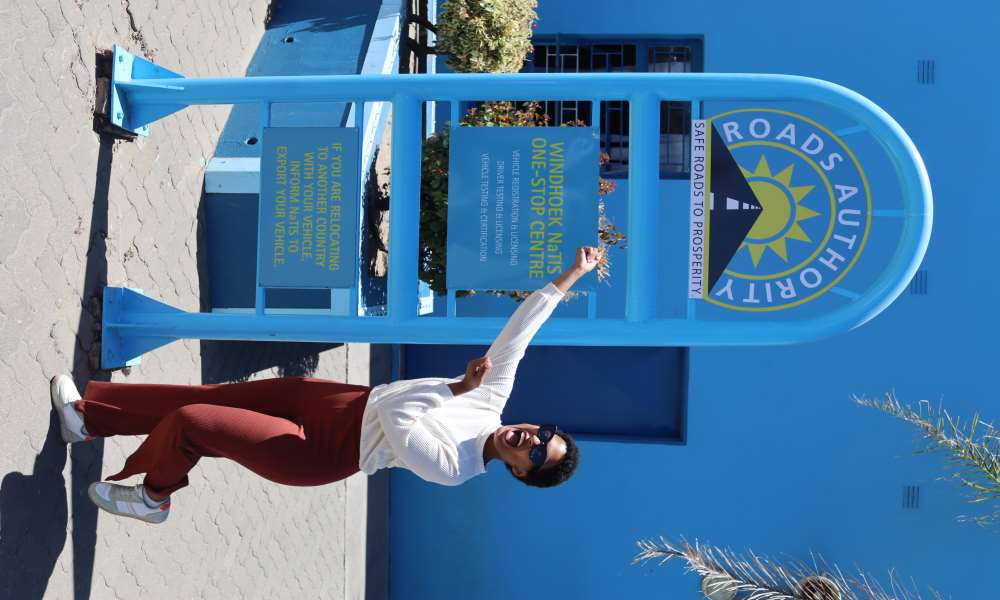Acquiring skills while in high school
It is essential to be on top of your game while you are still in high school. This article will focus on how you can acquire skills you will most probably need once your high school journey is completed.
One of them on top of the list is getting a learner’s licence. This is the first step towards getting your driver’s licence once you turn 18.
There is a process that needs to be followed when booking a learner’s licence, which is as follows:
Complete an application form (available at NATIS) and submit it with a certified copy of your identification document (ID) or passport. Pay the application fee of N$45. Your eyes will also be tested (visual acuity)
The following are the different categories of learner's licences:
Codes:
Code 1: Motorcycles
Code 2: Motor vehicles of which the tare does not exceed 3 500kg and
minibus, bus or goods vehicle for which gross vehicle mass (GVM) does
not exceed 3 500kg.
Code 3: Motor vehicle for which the tare exceeds 3 500kg
Age restriction
Code 1: Must be 16 years or older for Code A1 driver’s licence; and
17 years for Code A driver’s licence
Code 2: Must be 17 years or older
Code 3: Must be 18 years or older
The period of validity of a learner's licence is 18 months from the date of issue.
The learner's licence book can be bought at any grocery shop or service station.
Another skill you can obtain is acquainting yourself with Microsoft Office programmes. You will need these skills sooner than you think, especially for those who will head straight into work.
Namcloud Training Centre offers services such as Microsoft Excel professional lecture-based training for everyone who wants to unlock the power of Excel to utilise its ability to store, manage, analyse and visualise data.
Nipam
The Namibia Institute of Public Administration and Management (Nipam) also offers a range of training programmes where you can upskill yourself. These are some of the programmes which you can consider as a high school learner.
Occupational health and safety management and first aid
You will gain practical skills needed to address and promote good standards of occupational health and safety. The course also looks at ways public sector institutions can become compliant with the Namibian Occupational Health and Safety Act.
Customer care
This communications skills course helps people communicate effectively, appropriately and clearly in all situations.
Presentation skills
This course provides you with in-depth knowledge and skills in the planning, preparation and delivery of truly engaging presentations. You’ll learn how to use specific tools and techniques for presentation creation and delivery which will enable you to conduct powerful presentations that engage your audience every time.
Mastering secretarial skills
This will give you an in-depth understanding of the principles and best practices of successful administrators. It will also increase your impact and visibility at the office and will enable you to derive several action plans for taking on more challenges and raising your career a notch.
Time management and productivity
Effective time management is about identifying and defining long-term goals. With the long-term goal in mind, the next step is to set short-term goals that serve as building blocks to reach the desired long-term goal. You will tackle areas such as setting S.M.A.R.T. goals and discussing the tools commonly used for prioritisation.
The above-mentioned programmes are just a few of many you can consider. For more information, contact Joubert Tawana on 061 296 4867, 0811 660 455, or email [email protected].
One of them on top of the list is getting a learner’s licence. This is the first step towards getting your driver’s licence once you turn 18.
There is a process that needs to be followed when booking a learner’s licence, which is as follows:
Complete an application form (available at NATIS) and submit it with a certified copy of your identification document (ID) or passport. Pay the application fee of N$45. Your eyes will also be tested (visual acuity)
The following are the different categories of learner's licences:
Codes:
Code 1: Motorcycles
Code 2: Motor vehicles of which the tare does not exceed 3 500kg and
minibus, bus or goods vehicle for which gross vehicle mass (GVM) does
not exceed 3 500kg.
Code 3: Motor vehicle for which the tare exceeds 3 500kg
Age restriction
Code 1: Must be 16 years or older for Code A1 driver’s licence; and
17 years for Code A driver’s licence
Code 2: Must be 17 years or older
Code 3: Must be 18 years or older
The period of validity of a learner's licence is 18 months from the date of issue.
The learner's licence book can be bought at any grocery shop or service station.
Another skill you can obtain is acquainting yourself with Microsoft Office programmes. You will need these skills sooner than you think, especially for those who will head straight into work.
Namcloud Training Centre offers services such as Microsoft Excel professional lecture-based training for everyone who wants to unlock the power of Excel to utilise its ability to store, manage, analyse and visualise data.
Nipam
The Namibia Institute of Public Administration and Management (Nipam) also offers a range of training programmes where you can upskill yourself. These are some of the programmes which you can consider as a high school learner.
Occupational health and safety management and first aid
You will gain practical skills needed to address and promote good standards of occupational health and safety. The course also looks at ways public sector institutions can become compliant with the Namibian Occupational Health and Safety Act.
Customer care
This communications skills course helps people communicate effectively, appropriately and clearly in all situations.
Presentation skills
This course provides you with in-depth knowledge and skills in the planning, preparation and delivery of truly engaging presentations. You’ll learn how to use specific tools and techniques for presentation creation and delivery which will enable you to conduct powerful presentations that engage your audience every time.
Mastering secretarial skills
This will give you an in-depth understanding of the principles and best practices of successful administrators. It will also increase your impact and visibility at the office and will enable you to derive several action plans for taking on more challenges and raising your career a notch.
Time management and productivity
Effective time management is about identifying and defining long-term goals. With the long-term goal in mind, the next step is to set short-term goals that serve as building blocks to reach the desired long-term goal. You will tackle areas such as setting S.M.A.R.T. goals and discussing the tools commonly used for prioritisation.
The above-mentioned programmes are just a few of many you can consider. For more information, contact Joubert Tawana on 061 296 4867, 0811 660 455, or email [email protected].







Kommentar
Allgemeine Zeitung
Zu diesem Artikel wurden keine Kommentare hinterlassen